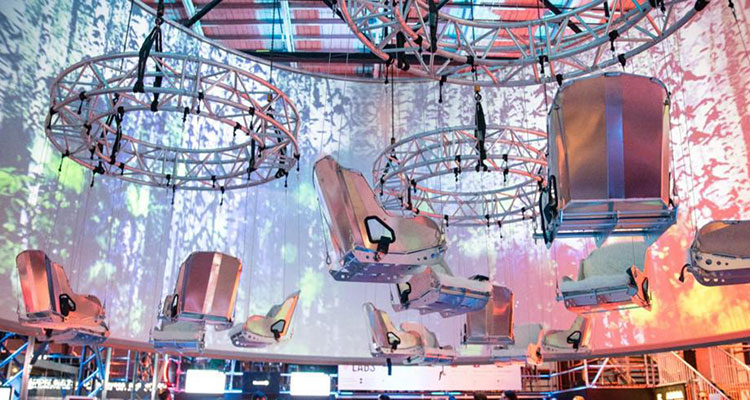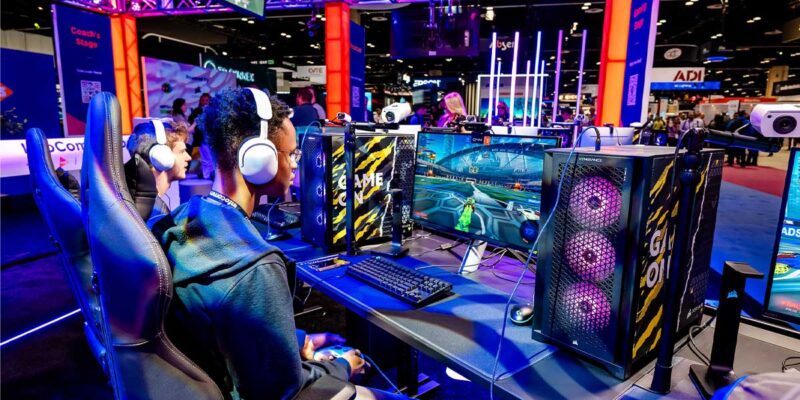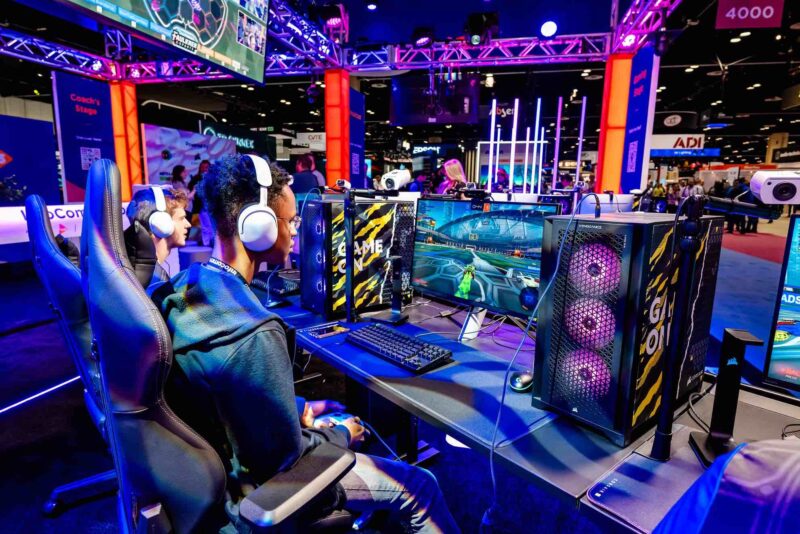InfoComm 2018 Recap, Part the Second: Words by Which to Live
 With the new branding, AVIXA appears to have picked up a new motto, one which many of us have seen on the various promotional items for sale in the AVIXA store at InfoComm: “Together, we can change the way people experience the world.” Those who know me I believe in language, and believe in having words by which to live. While this obviously doesn’t touch me as much as my personal motto (Yes, I have a personal motto. Friends might know what it is!), it does speak to the reason many of us are in this industry and what we can do at our best. For some thoughts on this, let’s go to the show floor.
With the new branding, AVIXA appears to have picked up a new motto, one which many of us have seen on the various promotional items for sale in the AVIXA store at InfoComm: “Together, we can change the way people experience the world.” Those who know me I believe in language, and believe in having words by which to live. While this obviously doesn’t touch me as much as my personal motto (Yes, I have a personal motto. Friends might know what it is!), it does speak to the reason many of us are in this industry and what we can do at our best. For some thoughts on this, let’s go to the show floor.
One of the more unusual booths this year was not an AV manufacturer or distributor. AVIXA invited C2 Labs, creators of the C2 business conference in Montreal. C2 Labs has an interesting modality in that they use shifts in physical context to put participants in an open frame of mind for conversations. For this set of experiences they spoke with Avixa about what questions the organization wanted answered and chose two of their “labs” — The Sky and The Darkness — as venues for the discussion. Did it work? What was the experience like? I sampled both and have thoughts about what this really means and how it fits the idea of “experience.”
The two questions were as follows:
“How can you use technology as a tool to implement your creative ideas, rather than technology function as the driver of creativity?”
“What is holding you back from embracing technology and related opportunities?”
 I spoke with C2 content and creation manager Nicla Donna about this, and was given a surprisingly literal explanations for their choices: The Sky was chosen to give a broad view from on high and the dark represented our being lost and unable to see. What was interesting is that I didn’t experience it that way; whether this is my perception and biases or their imperfect job of explaining it is a question I’ll leave to the reader.
I spoke with C2 content and creation manager Nicla Donna about this, and was given a surprisingly literal explanations for their choices: The Sky was chosen to give a broad view from on high and the dark represented our being lost and unable to see. What was interesting is that I didn’t experience it that way; whether this is my perception and biases or their imperfect job of explaining it is a question I’ll leave to the reader.
What was the experience? Each was fairly simple. Participants for the sky were seated in some swings and raised off the floor. A cylindrical projection screen surrounded the sky-meeting area, with Barco projectors displaying a semi-abstract skyscape. We’d then participate in a lightly moderated discussion, the focus of which was one of the above questions. The wraparound screen was sized to fill ones field of view, removing participants from any context. You would see the people with whom you were talking against an abstract background, removing most other stimulus. IT gave the discussion a different weight than it would have on the ground and the isolation forced us to focus.
 The second “lab” — The Dark — is even simpler. Attendees are invited to sit in a completely dark room for a similar discussion. Afterwards, I was told that part of the point of the experience is that absent visual cues you don’t know who you’re talking to — how they’re dressed, their apparent nationality, etc. This didn’t quite work as well as it could have for me because I met my companions for this journey while queued up waiting for it to start. As with the other experience, what struck me was the shift in context. This time, in darkness, voices stood out without any distraction. Also, without visual cues to see if anyone was listening, I found myself talking a bit less, pausing to see if anyone would answer or was there with me. Again, the context informs the experience.
The second “lab” — The Dark — is even simpler. Attendees are invited to sit in a completely dark room for a similar discussion. Afterwards, I was told that part of the point of the experience is that absent visual cues you don’t know who you’re talking to — how they’re dressed, their apparent nationality, etc. This didn’t quite work as well as it could have for me because I met my companions for this journey while queued up waiting for it to start. As with the other experience, what struck me was the shift in context. This time, in darkness, voices stood out without any distraction. Also, without visual cues to see if anyone was listening, I found myself talking a bit less, pausing to see if anyone would answer or was there with me. Again, the context informs the experience.
For those curious, here are my answers to the two questions:
On what is holding us back from embracing technology:
Using existing technology is both safe and easy – safe in that nobody will reject something with which they are already comfortable, and easy in that old solutions fit the picture we already have in our heads. By stepping into the dark and unseeing what we think we know we can embrace new solutions.
And on creativity:
We need to forget our preconceptions and approach problems as a blank slate. A “standard” solution is a well-worn path through the wilderness; the more we travel it, the easier it becomes to stay on the path. Creativity comes when we step out into virgin territory.
And yes, those were very similar answers. I wonder if experiencing the two labs with similar questions back-to-back taints the experience somewhat
In some ways the C2 event struck me as the inverse of the Shared Studios “Portals” project, which was discussed at the TIDE conference by Shared Studios founder Amar Bakshi. For those who don’t know, each portal is a video-teleconference system built into an identical shipping container. The idea is for participants to visit a portal in their city and connect with a stranger elsewhere in the world for a conversation. Bakshi, a former international reporter, described some of his most cherished moments as long conversations with strangers on a bus ride someplace halfway around the world from his home. Portals was his attempt to recreate this experience through videoconferencing technology. Each portal is a shipping container, painted black on the inside and gold on the outside. It’s essentially a minimalist immersive telepresence experience — rather than the formal office furniture you’d find in a traditional telepresence room, this is a literal blank slate. Again, we take people from disparate spaces, remove them from their context and place them in an artificial, transitional space. This reduces barriers to communication and lets us see the world from another’s perspective.
What’s a pity is that so many of us — perhaps because of our day jobs working with hardware — tend towards concrete thinking. When I mentioned C2 on Twitter, more than one person responded, “Are they the sky chair people?” I suppose they are, in a sense, the “sky chair people,” but that’s a reductive way of looking at it. I’d rather see them as working towards the same goal as all of us in Avixa. Remember our motto: “Together we can change the way people experience the world.” That’s what C2 is doing, that’s what Shared Studios does.
That is, at our best, what all of us do. It is who we are.
It is the words by which we live.





